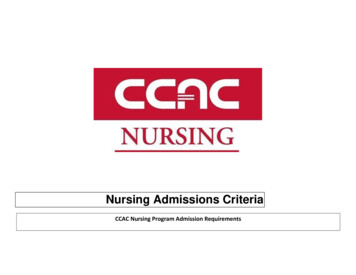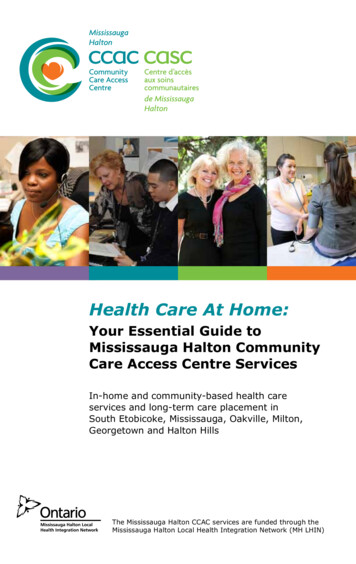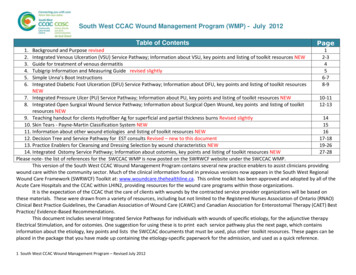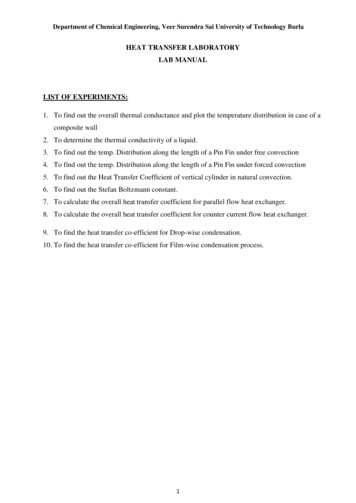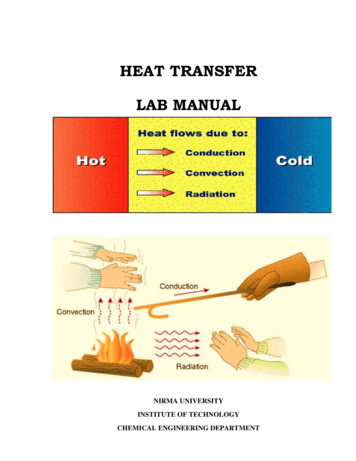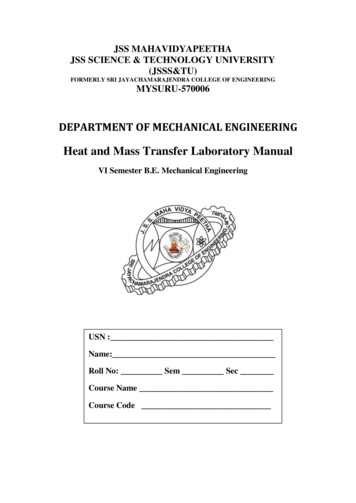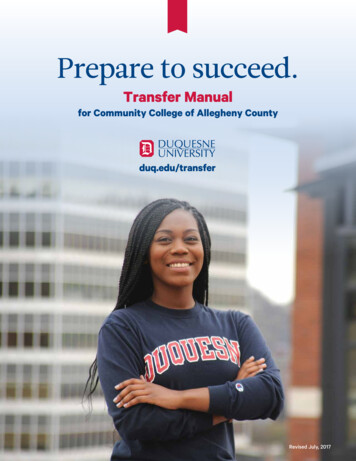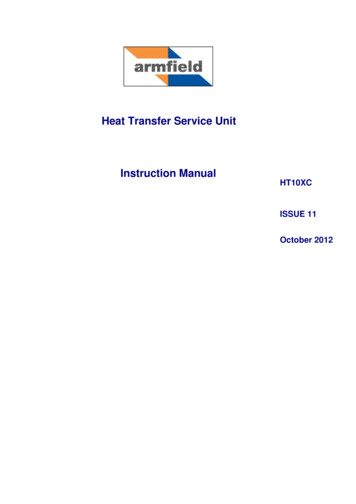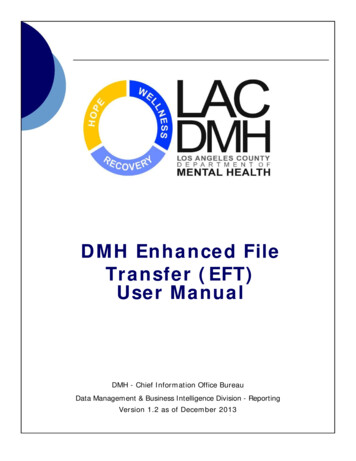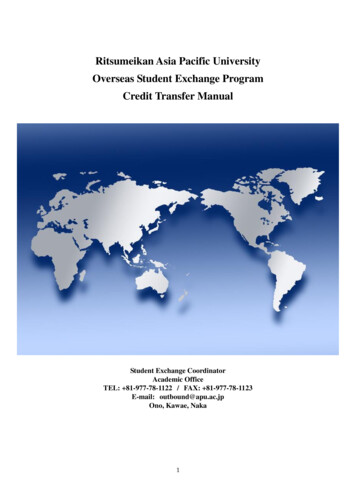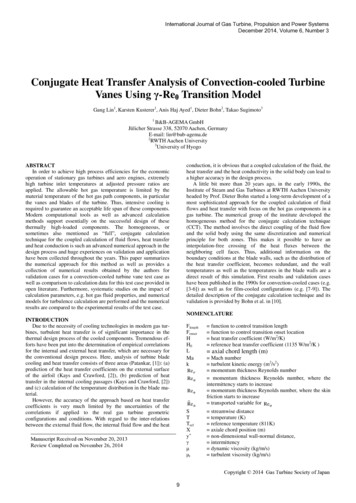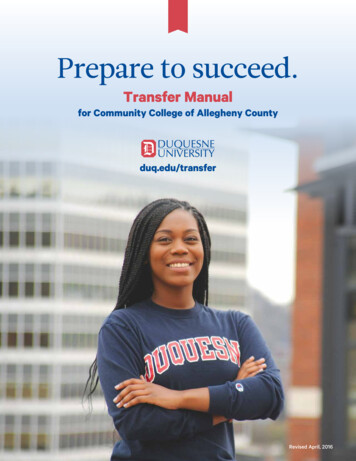
Transcription
Prepare to succeed.Transfer Manualfor Community College of Allegheny Countyduq.edu/transferRevised April, 2016
Table of ContentsGet Ready for Something MoreMore heart, more spirit, more tradition, more fun,more connections, more opportunity Get Ready for Something More.1Admission Process and Requirements.3Financing Your Education.3Degree Requirements.4University Core Curriculum.5College Level Examination Program. 7Palumbo-Donahue School of Business Administration.8 Transferable Credits.8 Suggested CCAC Courses.8 Suggested Curriculum.9 Courses Not Accepted.10John G. Rangos School of Health Sciences.11Center for Adult Learners.12McAnulty College of Liberal Arts.13 Academic Policies.13 Curriculum Requirements.13 Transferable Credits.14Mary Pappert School of Music. 22 Programs and Majors. 22 Admissions Criteria. 22Bayer School of Natural and Environmental Sciences.24 Curricular Requirements and Policies.24 Transferable Credits.26 Forensic Science and Law.29School of Nursing.30 Nursing Curriculum.30 Nursing Programs of Study.30School of Education. 32 Curriculum Requirements. 33 Core Curriculum/Transferable Credit. 33(See University Core on Page 5)Mylan School of Pharmacy. 35 Doctor of Pharmacy Program. 35More than TeachersAt Duquesne, the one thing you’ll notice right away is thecaliber of teaching. That’s because our faculty are worldrenowned scholars, researchers and mentors—among the besteducators in their fields—and committed to your experience asa student. With a 15-to-1 student-to-faculty ratio and an averageclass size of 28, your faculty will get to know you by name.Find Your Crowd, Get Involved!As a Duquesne student, you’ll learn with students from allcultural, socioeconomic and religious backgrounds from nearlyevery state and more than 80 countries. There are morethan 200 student organizations on campus, so you can getinvolved in student government, intramural sports or the manyfree or reduced fee activities available to students. For moreinformation, visit duq.edu/student-involvement.Military and VeteransDuquesne University enjoys a proud tradition of servingveterans. We have a team of veteran service providers and weare eager to assist you with questions you might have aboutjoining us as a student. For more information on resourcesfor military service members and veterans, please visitduq.edu/veterans.A Great Schoolat a Great PriceDuquesne is rated as a best value university by U.S. News,Washington Monthly and Kiplinger’s. These rankingsconsider key factors such as our quality of teaching, thecareer success of our graduates, our four-year graduationrate and our students’ lower levels of debt. And we offerspecial scholarships for transfer students.Support and Flexibility for Adult StudentsThe Center for Adult Learners provides admissions counseling,academic advisement and support services for adult studentswho wish to complete their undergraduate degree. Courses areoffered in an accelerated, online format designed for workingadult students. Students have access to the Online WritingCenter and Duquesne’s Gumberg Library. Technical support isreadily available to students who are new to the online learningenvironment. duq.edu/adultlearners11
Admission Process andRequirements*Applications should be submitted online at duq.edu/apply. An application maybe submitted at any time during the year up to July 1 for the fall semester orDec. 1 for spring semester—certain programs may have alternate deadlines—please see school pages for specifics. The application procedure is as follows:1. Complete and submit the online Application forUndergraduate Admission available at duq.edu/apply.Select “transfer.”2. A 50 non-refundable application fee is waived if theapplicant applies by December 15.3. Submit all official transcripts for complete high school andcollege academic records. Test scores may be required forsome majors. See individual school pages for requirements.4. Students transferring from a regionally accredited institutionmust present academic records with a minimum QPA/GPAof 2.5 or higher on a 4.0 quality point system. Only classeswith a “C” grade or higher may be considered for transfer.Live, Study and Make Friends for LifeDuquesne’s living learning centers are our version of residencehalls—only much more than a place to study, hang out and getsome sleep. It’s the epicenter of your personal experience oncampus, the place where you’ll grow into your own and find newfriends for life. duq.edu/residence-lifeCommuters Have a Home Away from HomeIncoming juniors and seniors have the option to live off-campus.The Commuter Center in the Duquesne Union provides a homeaway from home with study rooms, a computer lab and otherresources to support you. duq.edu/commuter-affairsStudy AbroadTransfer students can choose from more than 35 study abroadlocations, including our Italian Campus in Rome and theDuquesne in Dublin program in Ireland. Opportunities includeshort month-long programs starting in May, spring breakawaytrips as well as semester-long programs around the world.duq.edu/study-abroad25. When accepted, the student must provide the AcademicAdvisor of his/her school with a description of the courseswhich appear on the college transcript. The studentshould contact the Advisement Office of his/her school forplacement and curriculum planning following a reasonableperiod for evaluation of the college transcript.6. An interview is highly recommended for all transfer studentsand is required for some majors.7. Print out and submit completed transfer form, available atduq.edu/transfer-form.Additional documents may be required by a particular school/major. See individual school pages for specific school/majorQPA/GPA and other requirements.*Adult students interested in applying to the accelerated, online bachelor's degree program should visit duq.edu/adultlearners for application details.Students can choosefrom more than 35 studyabroad locationsFinancing Your EducationFinancial aid is comprised of scholarships, grants, loans and part-time employmentawarded to help meet the cost of education, which includes tuition, room and boardor a living expense, books and allowances for personal and transportation costs.Awards can be merit- or need-based and come through avariety of sources, including federal and state government,private organizations and the University itself. Duquesneoffers academic scholarships for all transfer students.Apply for any awards by May 1 of each year. When awardsare based in whole or part on financial need, you MUSTcomplete a Free Application for Federal Student Aid(FAFSA) each year. (Duquesne’s school code is 003258.)Since this form also constitutes application for StateGrants, special attention should be paid to the state grantdeadline listed with the FAFSA form. For Pennsylvania, thedeadline is May 1.For more information visit duq.edu/financial-aid, emailfaoffice@duq.edu or call 412.396.6607.3
Degree RequirementsAll students, regardless of major, must complete a minimum of 120 credits andthe University Core Curriculum in order to graduate—with the final 30 creditsat Duquesne. Please see school pages for program-specific information.CCAC COURSEDUQUESNE UNIVERSITY EQUIVALENTENG 101English Composition 1UCOR 101 Thinking and Writing Across the CurriculumENG 102English Composition 2UCOR 102 Imaginative Literature and Critical WritingMAT 201Calculus 1Core MathematicsMAT 220Business CalculusMAT 165Probability and StatisticsUniversity Core Curriculum (34 credits)Theme Area Courses: 12 creditsCritical thinking, problem-solving, leadership, honesty, integrityand services to others these are the hallmarks of a Duquesneeducation. They lay the intellectual and ethical foundationstudents need to succeed and grow as individuals throughoutlife.Satisfied by taking 3 credits from each of the followingTheme Areas:BIO 100Life ScienceBIO 133Environmental Science Creative ArtsPHY 107Astronomy Faith and Reason (must be taken at Duquesne)BIO 140Food Microbiology Global DiversityBIO 151General Biology 1The Core consists of 12 courses or 34 credits from a variety ofdisciplines. These requirements are: Social JusticeBIO 152General Biology 2BIO 160Introduction to Human PathologySample courses often transferable for the Theme Areas include:BIO 171Introduction to Human Pathophysiology Creative Arts: Art Appreciation, Art History, Creative Writing,Painting, Computer Art, Music Performance, CreativeDramaticsCHEM 109Introduction to ChemistryCHEM 110/111Introductory Chemistry/LabPHY 100Basic Physics Global Diversity: Intercultural Communication, GlobalEconomics, Global Literature, Global Geography, AfricanHistory, World Cinema, World Music, Cultural Anthropology,Global SociologyPHY 101Earth SciencePHY 141Physics 1PHY 142Physics 2PHY 221Physics for Science and Engineering 1PHY 222Physics for Science and Engineering 2PHY 223Physics for Science and Engineering 3PHL 101Introduction to PhilosophySOC 101Introduction to SociologySOC 208Urban SociologySOC 212Social ProblemsANT 117GlobalizationETH 101Ethnic and Diversity StudiesETH 111The Historical Development of the BlackCommunity in PittsburghETH 112Understanding Violence in AmericaETH 220History of Pittsburgh Civil Rights MovementEnglish Composition: 6 creditsSatisfied by: First-year Composition and First-Year LiteratureMathematics: 3 creditsSatisfied by: Calculus or Fundamentals of Statistics or Intro toBiostatics or Problem-Solving with Creative MathScience: 3 creditsSatisfied by: Biology or Chemistry or Physics or Earth Science orAstronomy or other approved Science coursePhilosophy: 3 creditsSatisfied by: Basic Philosophical Questions or Introduction toPhilosophyTheology: 3 creditsSatisfied by: Biblical and Historical Perspectives or TheologicalViews of the Person or Global and Cultural Perspectives ofTheologyEthics: 3 creditsSatisfied by: Philosophical Ethics or Theological Ethics orMedical Ethics or Health Care EthicsInformation Literacy: 1 creditSatisfied by: Research and Information Skills4CCAC courses that will satisfy Duquesne University core curriculum requirements Social Justice: Art and Politics, Race and Literature, NativeAmerican History, International Law, Social Justice inEducation, Perspectives on the Holocaust, Women andPolitics, Survey of Sociology, Women and Gender StudiesNOTE: One Theme Area must represent a history or arthistory discipline and one Theme Area must represent thesocial sciences (Economics, Political Science, Psychology orSociology)In addition to the Core Curriculum, each school has degreerequirements.If you are planning to transfer to Duquesne University, youshould take courses at the Community College that can besubstituted for the University Core Curriculum requirements.As you will see from the list that follows, many CCAC coursesmay be counted as University Core course equivalences.Core ScienceCore PhilosophySocial Justice CoreCourses within this manual are subject to change. Pleaserefer to the University Undergraduate Catalog available atduq.edu/registrar for current course offerings and requirements.5
CCAC courses that will satisfy Duquesne University core curriculum requirements(continued)College Level Examination Program (CLEP)A student may acquire credits by achieving a satisfactory scoreon one or more of the College Level Examinations — Subjectand General — listed below. Examinations may be taken atany CLEP Center. Students should check with their AcademicAdvisor to make sure that they are eligible to receive credit forthe particular exams they plan to take. (Students must wait 6months to retake a test.)Students whose total credits, including CLEP credits, do notexceed sixty (60), are permitted to take the following exams.Students who have failed or withdrawn from a course cannotreceive CLEP credit for that course.ART 100Introduction to Art HistoryART 103-142Choose one Art CourseART 168Digital ImagingART 170Web Graphic DesignDAN 101Modern Dance 1ENG 120The Art of FilmMUS 101Intro to MusicMUS 121History of Music 1MUS 122History of Music 2MUS 160American Popular MusicAmerican Government503POSC 105 American National GovernmentMUS 253History of JazzBiology503UCOR 121 Core Science - Biology604BIOL 111/111L Bio I: Cells, Genetics, Development/Bio 1 LabThis policy is subject to change.Creative Arts CoreExamAccounting, Principles ofMinimumScoreCredit653Current Course EquivalenceACCT 214 Financial AccountingSOC 211Racial/Ethnic MinoritiesBusiness Law, Introductory503BLAW 251 Business LawHIS 21320th Century World HistoryCalculus w/Elem. Functions553MATH 111 Calculus for Non-Science StudentsFCL 103Mythology554MATH 115 Calculus IGEO 101World Geography505*CHEM 131 Fundamentals of Chemistry IANT 104Native American Indians of North America658CHEM 121/122 General Chemistry I and IIETH 205Latino Cultural StudiesHistory of the U.S. I543HIST 203 U.S. to 1877ETH 206Asian-American StudiesHistory of the U.S. II553HIST 204 U.S. Since 1877Info Systems & Computer Apps.552COSC 100 Elements of Computer ScienceMacroeconomics503ECON 202 Principles of Macro EconomicsManagement, Principles of503MGMT 261 Introduction to ManagementMarketing, Principles of503MKTG 271 Introduction to MarketingMicroeconomics503ECON 201 Principles of Micro EconomicsPsychology, Introductory543PSYC 101 Introduction to PsychologyPHL 111Religions of the WorldPHL 155EthicsPHL 205Medical Ethics and LawGlobal DiversityCore TheologyEthicsChemistry, GeneralSociology, Introduction to503SOCI 101 Survey of SociologyWestern Civilization I573HIST 213 Western Civilization IWestern Civilization II563HIST 214 Western Civilization II*Evidence of lab experience (letter from lab supervisor) is necessary.CLEP General ExaminationsStudents with less than thirty (30) credits may take this exam for elective credit.ExamHumanities6MinimumScoreCredit563Current Course EquivalenceLiberal Arts elective7
Palumbo-Donahue Schoolof Business AdministrationFour Year Sample Plan (Effective Fall 2012)Requirements for the B.S.B.A. (122 credits)Transferable CreditsCCAC COURSECR.DUQUESNE EQUIVALENTCR.FRESHMAN YEARJUNIOR YEARUniversity Core (Subject to Change)Business Core101Thinking and Writing Across theCurriculum3 cr.102Imaginative Literature and CriticalWriting3 cr.100Calculus with Algebra I3 cr.110Calculus with Algebra II3 cr.Natural Science3 cr.Basic Philosophical Questions3 cr.Business and ProfessionalCommunications3 cr.Research and Info Skills*1 cr.ACC 104 Financial Accounting4ACCT 214 Financial Accounting3ACC 203 Managerial Accounting4ACCT 215 Managerial Accounting3BUS 103 Principles of Management3MGMT 261 Intro. to Management3BUS 104 Principles of Marketing3MKTG 271 Intro. to Marketing3BUS 108 Principles of Finance3FINC 331 Business Finance3BUS 251 Business Law 13BLAW 251 Business Law3ECO 102 Prin. of Macroeconomics3ECON 202 Prin. of Macroeconomics3ECO 103 Prin. of Microeconomics3ECON 201 Prin. of Microeconomics3BUS 101 Intro. to Business3BUAD 103 Gateway to Business1Business CoreBUS 130 Bus. Communications3COMM 202 Bus. and Prof. Communication3182Decision Tools for BusinessAnalytics3 cr.103Gateway to Business2 cr.251Business Law3 cr.Suggested CCAC Courses1ENG 101 English Composition 12ENG 102 English Composition 23MAT 120 Analytical Methods4MAT 220 Business Calculus5CIT 155 Excel Spreadsheets6BUS 101 Introduction to Business7030 A total of 60 credits can be accepted for transfer.Total Credits 30 CreditsSOPHOMORE YEARBusiness Core283Business Information Systems3 cr.281Business Statistics I3 cr.284Business Statistics II3 cr.BUS 103 Principles of Management214Financial Accounting3 cr.8ACC 104 Financial Accounting215Managerial Accounting3 cr.9ACC 203 Managerial Accounting201Principles of Microeconomics3 cr.10ECO 102 Principles of Macroeconomics202Principles of Macroeconomics3 cr.11ECO 103 Principles of Microeconomics261Introduction to Management3 cr.12BUS 104 Principles of Marketing271Introduction to Marketing3 cr.13BUS 108 Principles of Finance267Supply Chain Operations3 cr.14BUS 251 Business Law 1 Please do not take any other Business courses otherthan those listed, as they will not transfer.Business Finance3 cr.368WBusiness Ethics/Communications3 cr.6 creditsMajor Area of Concentration30 creditsTotal Credits 30 CreditsMajor Area of Concentration3 cr.Major Area of Concentration3 cr.Major Area of Concentration3 cr.Major Area of Concentration3 cr.12 creditsElectives and University Core22 credits8 credits A student can transfer no more than 27 credits ofBusiness courses. Economics courses do not need to becounted as Business courses.331Ethics3 cr.Theology3 cr.Faith and Reason3 cr.Non-Business Elective3 cr.Culture Requirement*3 cr.15 creditsTotal Credits 33 CreditsSENIOR YEARBusiness Core342Global Economic Perspectives3 cr.499WStrategic Management3 cr.6 creditsMajor Area of ConcentrationMajor Area of Concentration3 cr.Major Area of Concentration3 cr.Major Area of Concentration3 cr.Major Area of Concentration3 cr.12 creditsElectives and University CoreSocial Justice3 cr.Non-Business Elective2 cr.Creative Arts3 cr.Elective **3 cr.11 credits* Recommended by academic advisor.** May be business or non-business elective.8Total Credits 29 Credits9
Palumbo-Donahue School of Business Administration(continued)Students registering for 300-400 level business courses must have successfullycompleted 60 credits and have Junior standing. Students are responsible for knowingand adhering to the prerequisites for those courses in which they are registered.The sample plan has a degree of flexibility. The University Core and Communication/Culture requirements may be taken at any time during the student’s program.Students may consult their academic advisor for further information.Academic Programs and DegreesBachelor’s Degree ProgramsThe RSHS offers four-year bachelor’s degree programsin Athletic Training (B.S. in Athletic Training) and HealthManagement Systems (B.S. in Health Managemen
short month-long programs starting in May, spring breakaway trips as well as semester-long programs around the world. duq.edu/study-abroad Students can choose from more than 35 study abroad locations Admission Process and Requirements* Applications should be submitted online at duq.edu

